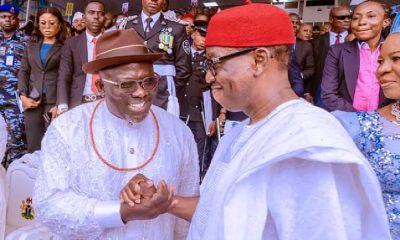Opinion
OF AKPABIO, NATASHA, AND SENATE’S “CIRCUS SHOW”

BY BOLAJI AFOLABI
Many years back as teenagers in Kaduna, which by the way was the political capital of the (then) Northern region, the writer and group of friends, school mates, and play-mates had pleasant taste of access to modernity. Even as children of middle-class parents who were either civil servants, or in the semi, and informal sectors, basic necessities were readily available and accessible; not what is prevalent today. We spent hours playing street football, and devoting quality time on the tracks, and indoor sports hall of the magnificent Ahmadu Bello stadium, situated on the very busy Constitution road. Aside from this pastime, which became permanent fixtures on our daily schedule; minus Sundays, television-watching was next. As children, we love the various sporting and drama programmes on the Nigerian Television, (NTV) which later changed to Nigerian Television Authority, (NTA). How can one forget the nine p.m. flagship news which was a compulsory-watch by the writer’s parents. Daily, one sat glued to the large Technics model black and white (later changed to) Phillips coloured TV set for about 45 minutes wondering what the likes of Bimbo Roberts, Sienna Alwell-Brown, and Ronke Ayuba were saying even as they read the news with much grace, flair, poise, and masterful diction.
One of the programmes that somewhat arrested the interest and time of children was Circus Show. Though the characters were foreigners, it was difficult to keep pace with the speed, styles, and precision of their theatrics but the programme was a must-watch. It was very popular that children mimicked the actors, and played-out some of the scenes. In later years, the import and message of the programme made more sense. It was purely comical, full of amusements, and laughter laced with drama and pretence. Over three decades after, many people of my generation still have nostalgic memories about the programme. Somehow, on the sidelines of any social event where we meet, it is discussed by all. Sadly, further introspection, and unbiased analysis of the entire programme may be used to describe some of the happenings in our daily lives, society, and nations.
The writer watched video clips of Senate’s plenary session of Thursday, March 6, where it deliberated and passed the recommendation of its Committee on Code of Conduct, Ethics, and Privileges, with the suspension of Senator Natasha Hadiza Akpoti-Uduaghan for six months as the major decision. Not done, the Senate took some other decisions against the Kogi Central Senator including non-payment of salaries and allowances during the period of suspension; no access to the National Assembly; lockdown of her office; withdrawal of security agents from her. Within racy minutes of step-by-step play-back of events, and scenarios of the Akpabio/Natasha conflict that culminated in her suspension, the forgotten, and likely rested “Circus Show” TV programme came to my consciousness.
About two weeks back, Natasha, on the floor of the red chamber complained about the change of her sitting position to Akpabio, as the President of the Senate. Thereafter, in an Interview on the ARISE NEWS channel, the amazon who is of Nigerian and Russian parentage made some accusations against the former Akwa Ibom state governor which includes sexual harassment. During the course of the media interaction, Natasha came across as bold, fearless, and audacious. Any discerning mind could easily decipher that she probably had more revelations to throw out. Perhaps, for lack of time, being a live programme, Nigerians were “denied” the opportunity of more stain and spoil of the red half of the country’s parliament.
As expected, the Senate’s initial reaction to the litany of accusations against Akpabio by Natasha drew the ire of many Nigerians. With loads of negative public perception hanging on its neck, every step of action and decision made by the Senate elicited public opprobrium. At every forum, social media, and gathering, it was a collage of sighs and hisses. Perhaps, people were taken aback, not impressed, and disillusioned by the Senate’s attempt to allegedly water-down, trivialize, and poo-poo the accusations against Akpabio. Perhaps, having taken stands, and formed opinions on the matter, many people were not willing and prepared to hear the Senate. That is the power of perception, particularly when negative.
Given the negative effects Natasha’s interview and allegations against Akpabio will have on the institution, some attempts were made to address the issues, and possibly change the narratives. Past and present female Senators Biodun Olujimi, Florence Ita-Giwa, and Ireti Kingibe appeared on television station(s) to lend their voices in the defence of the Senate. Some people concluded that their efforts to douse tensions were scarcely achieved as responses to questions further increased the frenzy. Also, it was argued that some new angles begging for more inquisition came to light.
Though the Senate may not publicly admit and agree, the development has ruffled some feathers, and thrown the institution into cacophony of palpable moral doubt, denigration, and derogatory position. Sadly, some Senators who are truly distinguished are victims of collateral damage occasioned by the “odourtic” and shameless development. The space, speed, and suddenness of comments and reactions to the issues somehow confirmed that some people are worried and disturbed. Few others may be mindful of where the pendulum may switch to. The fierce anger, combative posture, and skewed conjectures demonstrated by few Senators, either on the floor of the chamber or in the media are further confirmations that the matter “no make person laugh.” For instance, Senator Cyril Fasuyi, representing Ekiti North came up with some non-ingenious “truth” which was immediately, and robustly dismissed as “inadvertently misrepresenting the facts, as no such allegations (by Natasha) has ever been made against Dr. (Kayode) Fayemi,” by the state’s immediate past governor. After Fayemi’s sincere, matured, and principled rebuttal, which gained currency on media space, one hopes that, going forward, Fasuyi will take some vital, and enduring lessons in facts-verification on matters before going public.
That the Senate has now rolled out about seven decisions in its suspension of Natasha should not surprise discerning Nigerians. The same should apply to every chronicler of national events, particularly the parliament. Fact, the leadership (no matter how wrong, faulty) will always have its way. Conversely, the other party in such situations (no matter how convincing) will end up with the smallest part of the stick; if lucky. That the Senate, through Akpabio hit the gavel against Natasha was further confirmation of the writer’s thoughts after watching the Spokesperson; Yemi Adaramodu on CHANNELS TV programme a few days back. Looking unperturbed, the Ekiti-born Senator who exhibited concealed triumphalism amid who-cares and dismissive comportment described the crisis as a “storm in the tea cup.”
However, after the “magisterial” verdict, the Senate failed to address the main issue. Allegations of sexual harassment against Akpabio remains the crux of the matter. This is the “koko” of the altercation. The writer like many Nigerians is not sure if this was tackled by the Senate, who by the way appears to be in a hurry to put the matter to bed. Somehow, the issue, which may possess a life of its own may resist any, and every effort to consign it to the garbage of national history. Going by the numerous parliamentary breaks and national holidays, the 6 months suspension (if it stays) may effectively rise to 8 or 9 months.This, may further extend the lifespan of the sexual harassment allegations.
According to a school of thought, the sexual harassment allegations may actually be the fall out of previous cases of high-handedness, marginalization, and vindictiveness. Another school of thought posited that removing Natasha as Chairman, Committee on Local Content may not be wrong; on face value. However, replacing her with Senator Ede Dafinone, Delta Central; her husband’s representative in the red chamber may be a calculated attempt to rubbish and possibly cow her. Also, appointing Senator Onowakpo Thomas, Delta South as Deputy was an aberration and flagrant contravention of the Federal Character policy as it relates to allocation of Committees in the Senate. Indeed, the rumour mill is alive of unsubstantiated talks that few unnamed Senators, scared of the visibility, and mileage Natasha was leveraging from Local Content decided to strategize on how best to whittle down her influence.
In all of this “penkelemes” borrowing the coinage of Chief Adegoke Adelabu, Leader of Opposition in the Western Regional Assembly; Federal Minister of Natural Resources & Social Services; and Chairman, Ibadan District Council in the First Republic, there are some observations, and puzzles. How well did the Minority Leadership in the Senate protect one of its own? Why were the North Central Caucus, and Northern Senators Forum quiet? What happened to the voices of the Governor Bala Mohammed-led PDP Governors Forum? Not forgetting the PDP National Working Committee, (NWC), and PDP Board of Trustees, (BOT)? Were the Elders and Leaders of the PDP so engrossed with the 2027 presidential battle that they abandoned their only female Senator from the North to face the confideracy of forces? Finally, the writer hopes, when tempers simmer down, there will be an amicable resolution of the crisis which has done damage to the families of Akpabio and Akpoti-Uduaghan. It is expected that as days goes by, the two Senators after thorough introspection of the issues will pick few lessons that are germane to future personal, political, and public service experience.
* BOLAJI AFOLABI, a Development Communications specialist, was with the Office of Public Affairs, The Presidency, Abuja.
Opinion
CBN under Cardoso and $6.83 Billion balance of payments surplus in 2024 that signals economic resurgence

By Ibrahim Modibbo
Since his appointment as the Governor of the Central Bank of Nigeria, in October 5, 2023, Olayemi Cardoso has continue to bring on board wide-range of macroeconomic reforms, stronger trade performance, and renewed investor confidence in Nigeria’s economy, that were aimed at putting the country back to its economic footing, as a strong economy that is second to none in Africa.
As part of the ongoing reforms, the Central Bank of Nigeria recently announced a Balance of Payments (BOP) surplus of $6.83 billion for the 2024 financial year, marking a decisive turnaround from deficits of $3.34 billion in 2023 and $3.32 billion in 2022, according to a press statement from Mrs Sidi-Ali, Hakama, the Ag. Director, Corporate Communications of the apex bank.
CBN says “the current and capital account recorded a surplus of $17.22 billion in 2024, underpinned by a goods trade surplus of $13.17 billion. Petroleum imports declined by 23.2% to $14.06 billion, while non-oil imports fell by 12.6% to $25.74 billion. On the export side, gas exports rose by 48.3% to $8.66 billion, and non-oil exports increased by 24.6% to $7.46 billion.”
While “remittance inflows remained resilient, with personal remittances rising by 8.9% to $20.93 billion. International Money Transfer Operator (IMTO) inflows surged by 43.5% to $4.73 billion, up from $3.30 billion in 2023, reflecting stronger engagement from the Nigerian diaspora. Official development assistance also rose by 6.2% to $3.37 billion,” the statement added.
Nigeria recorded a net acquisition of financial assets totalling $12.12 billion. Portfolio Investment inflows more than doubled, increasing by 106.5% to $13.35 billion, while resident foreign currency holdings grew by $5.41 billion, indicating stronger confidence in domestic economic stability. Although foreign direct investment fell by 42.3% to $1.08 billion, the overall financial account posted notable gains.
The country’s external reserves increased by $6.0 billion to $40.19 billion by year-end 2024, bolstering its external buffer.
Notably, net errors and omissions narrowed significantly by 79.5% to negative $5.10 billion in 2024, down from $24.90 billion in 2023, reflecting substantial improvements in data availability and capture. This represents a major advance in data accuracy, transparency, and overall reporting integrity.
The 2024 BOP surplus highlights the effectiveness of Nigeria’s ongoing reform agenda. The liberalisation and unification of the foreign exchange market, a disciplined monetary policy approach to managing inflation and stabilising the naira, and coordinated fiscal and monetary measures have all contributed to enhanced competitiveness and investor sentiment.
“The positive turnaround in our external finances is evidence of effective policy implementation and our unwavering commitment to macroeconomic stability,” said the Governor of the Central Bank of Nigeria. “This surplus marks an important step forward for Nigeria’s economy, benefiting investors, businesses, and everyday Nigerians alike,” the statement further noted.
Other notable indicators to building strong economy by this policy include but not limited to a stronger trade performance, particularly in the current and capital accounts, with a surplus of $17.22 billion in 2024, has contributed to the balance of payments surplus. A goods trade surplus of $13.17 billion that will further strengthens the positive trend. The decline in petroleum and non-oil imports also contributes to a more favorable trade balance.
It will noteworthy to note that the CBN’s reforms have increased investor confidence, leading to higher foreign portfolio investment inflows. Portfolio investment inflows more than doubled in 2024, reaching $13.35 billion. This influx of capital indicates a stronger belief in the stability and growth prospects of the Nigerian economy.
The apex bank’s disciplined monetary policy and FX market reforms on the other hand are aimed at managing inflation and stabilizing the Naira, has contributed to a more stable financial system.
The liberalization and unification of the foreign exchange market have led to greater transparency and reduced distortions in the market.
The implementation of an Electronic Foreign Exchange Matching System (EFEMS) further enhances transparency and efficiency in the FX market.
The reforms, including the unification of the exchange rate, have improved Nigeria’s competitiveness and attracted more foreign investment. Testament to this is the clearing of a $7 billion forex backlog which has also boosted the country’s image with foreign investors.
Also, the significant improvements in data availability and capture have led to a marked reduction in net errors and omissions in the balance of payments data. This enhanced data integrity provides a more accurate picture of the country’s economic performance and builds trust with stakeholders.
In conclusion, the combination of strong trade performance, renewed investor confidence, disciplined monetary policy, and improved data integrity, all facilitated by the CBN’s wide-ranging reforms, are key indicators of Nigeria’s economic resurgence. These developments demonstrate the positive impact of the reforms on the nation’s external finances and overall economic stability.
Dr Moddibo, a public analyst, wrote in from Abuja
Opinion
CBN leads financial dialogue with JP Morgan, NGX, others, in pre-spring meetings Forum

By Dr. Ibrahim Modibbo
In anticipation of the International Monetary Fund (IMF) and World Bank Group (WBG) Spring meetings which commenced on Monday, April 21, 2025, the Central Bank of Nigeria (CBN) partnered with J.P. Morgan, the Nigerian Exchange Group (NGX) and Africa Private Capital Association (AVCA) to host a high-profile global forum at Nasdaq MarketSite in New York on Thursday, April 17, 2025, according to press statement by Dr Ibrahim Moddibo.
The forum, titled “The Nigeria Investment Agenda: Pathways for Growth & Global Partnerships,” convened global investors, diaspora leaders, and senior financial stakeholders to examine Nigeria’s macroeconomic prospects and ongoing reform progress.During his commanding address, Governor Olayemi Cardoso outlined his comprehensive reform strategy encompassing monetary tightening, foreign exchange market transparency, and enhanced financial governance.
He emphasized that these initiatives are establishing the foundation for sustainable macroeconomic stability and heralding a new era of transparency and confidence.Governor Cardoso reaffirmed the CBN’s unwavering commitment to rebuilding credibility through orthodox monetary policy, transparency, and consistency.
“We inherited a crisis of confidence but chose a different path. We’re not turning back,” he stated decisively.In a powerful fireside chat between the Governor and Nobel Prize-winning economist Dr. James Robinson, Reverend Richard L. Pearson Professor at the University of Chicago, Governor Cardoso elaborated on his vision to reestablish the CBN as a credible, trusted institution – rooted in domestic excellence and respected internationally.Mr. Muhammad Sani Abdullahi, Deputy Governor for Economic Policy at the CBN, delivered a macroeconomic update highlighting sharp increases in foreign exchange turnover, emerging signs of disinflation, and strengthening external reserves. “With a market-determined exchange rate and a transparent, rules-based policy framework, confidence is gradually being restored in Nigeria’s economy,” he noted.
Welcoming participants to the forum, Dr. Nkiru Balonwu, Adviser to the CBN Governor on Stakeholder Engagement and Strategic Communication, framed the forum as a key moment in the Bank’s broader engagement strategy. “Today is more than a conversation,” she noted.
It’s about opening the books on the CBN’s transformation story under Governor Cardoso – sharing the facts, interrogating the progress, and looking ahead together at what more can be done to build sustainable partnerships and unlock long-term capital,” she explained.
Another key highlight of the event was the panel discussion entitled “Repricing Nigeria: Assessing the Scope for Sustained Change.” Moderated by Gavin Serkin, Founder of New Markets Media & Intelligence, the panel featured global financial luminaries: Joyce Chang, Chair of Global Research at JPMorgan Chase; Jason Rekate, Global Co-Head of Corporate Banking at Citi; Razia Khan, Chief Economist for Africa & Middle East at Standard Chartered; and Ahmad Zuaiter, Co-Founder & CIO of Jadara Capital Partners. Each panelist provided expert perspectives on Nigeria’s investment landscape, noting renewed international interest driven by improved fundamentals, strengthened governance, and clearer policy direction.
The CBN Board and Monetary Policy Committee were represented by US-based diaspora members Mr. Robert Agbede, Prof. Melvin Ayogu, and Dr. Aloysius Ordu, underscoring the Bank’s global engagement and commitment to leveraging Nigerian talent worldwide. Temi Popoola, Group CEO of NGX, moderated the Q&A session, while Dr. Olubukola Akinniyi Akinwunmi, Director of Banking Supervision at CBN, delivered the closing remarks.The forum focused on substantive discussions and future prospects: engaging critical voices, evaluating progress, and identifying requirements for building lasting partnerships and attracting long-term capital. Central to this endeavor is a clear objective: reestablishing the CBN as a credible, trusted institution respected globally and dedicated to excellence at home.
Dr. Ibrahim Modibbo, a public affairs analyst writes from Abuja.
Opinion
Instagram , WhatsApp troubled by antitrust laws

By Sonny Aragba-Akpore
While we are yet to grapple with the fate of Tik Tok which President Donald Trump had asked its parent company Byte Dance of China to divest from it’s American operations or be banned, Meta Group, owners of Instagram and WhatsApp, is troubled over antitrust concerns.
The U.S. Federal Trade Commission (FTC) has taken the group to court over anti competition issues.
Specifically, the FTC wants Meta to divest from its two biggest companies in an antitrust trial that could redefine the future of social media.
And so Meta’s world is troubled as Mark Zuckerberg’s company could be forced to sell Instagram and WhatsApp if it loses the lawsuit that has just begun in the U.S.
The FTC has accused Zuckerberg’s company of having bought both platforms to eliminate competition and maintain a monopoly on social media.
If the court rules against them, it would be a historic blow to the tech giant.
Zuckerberg acquired Instagram in 2012, and then, two years later,(2014) completed his trio by buying WhatsApp.
Facebook is the third leg of the trio and this easily makes the group the largest tech owner in the world.
Although these acquisitions were approved by the FTC itself at that time ,but now this lawsuit seeks to reverse that approval, arguing that the purchase was not for innovation but to “neutralize” emerging rivals like Instagram which was acquired in 2012 and thus take control of the entire market.
The FTC claims that Meta has used its financial muscle to block competition, buying up emerging apps instead of competing with them, and it has been doing this since 2008! Everything is based on 2012 emails where Zuckerberg had expressed concern about Instagram’s rapid growth compared to Facebook’s performance (which was his only app at the time). In those emails, Zuckerberg admitted it was better to buy than to compete. And so he did, acquiring the app years later.
“On the other hand, he also bought WhatsApp, and of course that reinforces the FTC’s accusation. Meta strengthened its control over the digital system, keeping these apps as separate platforms but under the same power structure” analysts reason.
Meta has not denied the purchases, even though it rejects having acted in an anti-competitive way, calling the case a “weak lawsuit that ignores reality,” since they believe they face strong competition from platforms like TikTok, YouTube or X among many other apps.
During the trial, Zuckerberg claimed he bought Instagram for its camera technology, not because the social network was on the rise, but the 2012 messages don’t seem to support that statement very well.
In the likelihood that FTC wins this case, Meta could be forced to sell Instagram, WhatsApp, or both. This wouldn’t necessarily mean an immediate change for users, but it would shift the balance in the digital market, according to experts.
Digital sociologists think that Meta would make it easier to regulate social networks individually by the FTC.
One of the major implications will be on things like content moderation, privacy, or the use of personal data.
“If it gets split, it would be easier for lawmakers, ensuring proper service to users” digital sociologists admit.
There are however fears of who buys if it gets to that .
For instance If a controversial figure like Elon Musk or an investment fund takes control of Instagram, like what happened with Twitter (now X), it’s possible that many users would leave in large numbers for new alternatives that may emerge, like BlueSky.
“But if it falls into the hands of a discreet company, without major visible changes, it’s likely that most people will keep using it as they always have.”
Although Meta does not reveal exactly how much it earns from each app, it is estimated that Instagram generates around $37 million a year, surpassing Facebook’s revenue according to analysts.
“So of course, Zuckerberg’s eagerness to get out of this case is clear: they can’t afford to lose that income because it would be a catastrophe for Meta” another analyst submits.
The expectations are dicey because the court’s decision will not only affect Meta, but could also open the door to more lawsuits against other big platforms for similar monopoly practices. And at a time when the control of social networks is more questioned than ever, this case could define the future of the digital system in terms of free choice and regulations.
Instagram and WhatsApp which were acquired over a decade ago have become social powerhouses and easily the biggest platforms in that genre.
This looming antitrust trial will be the first big test of President Trump’s Federal Trade Commission’s ability to challenge Big Tech.
The lawsuit was first filed against Meta — then called Facebook — in 2020, during Trump’s first term. It claims the company bought Instagram and WhatsApp to squash competition and establish an illegal monopoly in the social media market.
FTC contends that Meta has maintained a monopoly by pursuing CEO Zuckerberg’s strategy, “expressed in 2008: ‘It is better to buy than compete.’ True to that maxim, Facebook has systematically tracked potential rivals and acquired companies that it viewed as serious competitive threats.”
U.S. antitrust laws are enforced by both the FTC’s Bureau of Competition and the Antitrust Division of the Department of Justice. The agencies consult before opening any investigation. The Antitrust Division handles all criminal antitrust enforcement.
The FTC,s Bureau of Competition enforces the nation’s antitrust laws, which form the foundation of a free market economy.
The antitrust laws promote the interests of consumers; they support unfettered markets and result in lower prices and more choices.
The Federal Trade Commission Act and the Clayton Act, both passed by Congress in 1914, give the Commission authority to enforce the antitrust laws.
These laws prohibit anticompetitive mergers and business practices that seek to prevent hard-driving competition, such as monopolistic conduct, attempts to monopolize, and conspiracies in restraint of trade.
The Bureau of Competition investigates potential law violations and seeks legal remedies in federal court or before the FTC’s administrative law judges. The Bureau also serves as a resource for policy makers on competition issues, and works closely with foreign competition agencies to promote sound and consistent outcomes in the international arena.
WhatsApp (officially WhatsApp Messenger) is an American social media, instant messaging (IM), and voice-over-IP (VoIP) service owned by technology conglomerate Meta. It allows users to send text, voice messages and video messages, make voice and video calls, and share images, documents, user locations, and other content.
WhatsApp’s client application runs on mobile devices, and can be accessed from computers.
The service requires a cellular mobile telephone number to sign up.
In January 2018, WhatsApp released a standalone business app called WhatsApp Business which can communicate with the standard WhatsApp client.
The service was created by WhatsApp Inc. of Mountain View, California, which was acquired by Facebook in February 2014 for approximately US$19.3 billion.
It became the world’s most popular messaging application by 2015,and had more than two billion users worldwide by February 2020,confirmed four years later by 200 million new registrations per month.
By 2016, it had become the primary means of Internet communication in regions including the Americas, the Indian subcontinent, and large parts of Europe and Africa.
Instagram is an American photo and short-form video sharing social networking service owned by Meta Platforms. It allows users to upload media that can be edited with filters, be organized by hashtags, and be associated with a location via geographical tagging.
Posts can be shared publicly or with preapproved followers. Users can browse other users’ content by tags and locations, view trending content, like photos, and follow other users to add their content to a personal feed.
A Meta-operated image-centric social media platform, it is available on iOS, Android, Windows 10, and the web. Users can take photos and edit them using built-in filters and other tools, then share them on other social media platforms like Facebook.
It supports 32 languages including English, Hindi, Spanish, French, Korean, and Japanese.
Instagram was originally distinguished by allowing content to be framed only in a square aspect ratio of 640 pixels to match the display width of the iPhone at the time.
In 2015, this restriction was eased with an increase to 1080 pixels. It also added messaging features, the ability to include multiple images or videos in a single post, and a Stories feature—similar to its main competitor, Snapchat, which allowed users to post their content to a sequential feed, with each post accessible to others for 24 hours.
As of January 2019, Stories were used by 500 million people daily.
Instagram was launched for iOS in October 2010 by Kevin Systrom and Mike Krieger. It rapidly gained popularity, reaching one million registered users in two months, 10 million in a year, and one billion in June 2018.
In April 2012, Facebook acquired the service for approximately US$1 billion in cash and stock. The Android version of Instagram was released in April 2012, followed by a feature-limited desktop interface in November 2012, a Fire OS app in June 2014, and an app for Windows 10 in October 2016.
Although often admired for its success and influence, Instagram has also been criticized for negatively affecting teens’ mental health, its policy and interface changes, its alleged censorship, and illegal and inappropriate content uploaded by users.
-

 News23 hours ago
News23 hours agoINSECURITY! Enough is enough, Tinubu tells security chiefs, NSA
-

 News23 hours ago
News23 hours agoJust in: Air Peace suspends all scheduled flights nationwide
-

 News22 hours ago
News22 hours agoINEC moves to legalise voting without PVC
-

 Economy14 hours ago
Economy14 hours agoSEE current exchange rate of the Dollar to Naira
-

 News18 hours ago
News18 hours agoJust in: PDP can never die over gale of defection -Hon Teejay Yusuf insists
-

 Politics23 hours ago
Politics23 hours agoFCT minister, Wike, Uzodinma hail Okowa/Oborevwori defection to APC
-

 News11 hours ago
News11 hours agoJUST IN: Rivers Sole Administrator Ibas Shun Reps Panel
-

 Opinion20 hours ago
Opinion20 hours agoCBN under Cardoso and $6.83 Billion balance of payments surplus in 2024 that signals economic resurgence




